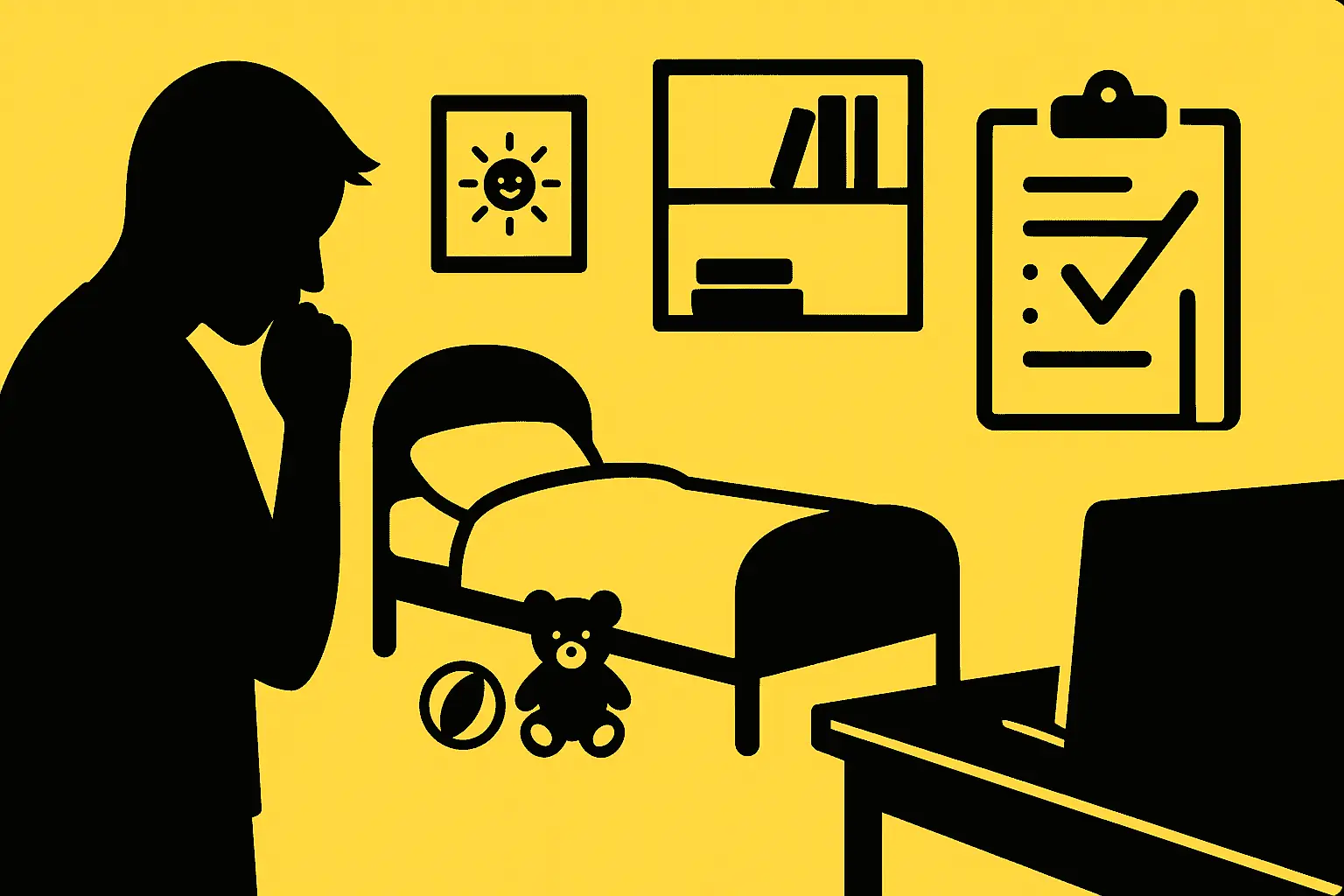Last Updated: Friday, 5 September 2025
The letter from CAFCASS arrives, and it confirms the one part of this process you’ve been dreading most: they want to conduct a home visit as part of the Section 7 report investigation. For many fathers, this is the most intimidating step. The idea of an officer inspecting your home, your life, and your parenting can feel like a high-stakes test you can’t afford to fail. Will they judge your furniture? Your tidiness? What do you need to do to “pass”?
I have been subjected to significant emotional discomfort when I see good fathers overwhelmed by this anxiety. It’s crucial to understand that this is not a white-glove inspection. The officer is not there to see a show home; they are there to see a family home. This is your opportunity to show, not just tell, that you are a capable, loving, and child-focused father. This guide will provide a clear, strategic plan to help you prepare with confidence and demonstrate the reality of your positive parenting.
Key Takeaways:
- The standard is “Good Enough,” not perfect. CAFCASS officers are looking for a “good enough” standard of parenting and a home that is safe, warm, and centred around the child’s needs.
- Safety and child-centricity are the top priorities. The officer will check for obvious hazards and look for clear evidence that your home is set up to meet your child’s needs (e.g., they have their own space, age-appropriate toys).
- Your interaction with your child is your best evidence. If your child is present during the visit, the officer will be paying close attention to the warmth, quality, and reality of your relationship.
- Preparation is about demonstrating readiness, not staging a performance. A strategic approach is to ensure the basics are covered and to be ready to talk calmly and knowledgeably about how you meet your child’s needs.
Feeling anxious about your CAFCASS home visit? WhatsApp us now for expert guidance on how to prepare the right way.
Quick Navigation:
Preparing for the Visit: A Practical Checklist
The purpose of the CAFCASS home visit is for the officer to get a real-world sense of your child’s life with you. As a consultant who used to conduct these exact visits and write these reports, I can tell you that we are trained to focus on the fundamentals of a child’s welfare.
Being prepared shows that you are a capable and thoughtful parent. Panicking is not necessary; methodical preparation is key. Here is a practical checklist to help you prepare strategically and without stress.
A Simple Checklist for Preparing Your Home
Think of this as covering the basics. A few small steps in advance will show CAFCASS you’re organised, child-focused, and ready for your child to spend time in your care.
The Week Before:
- ✅ Child’s Space: Ensure your child has a clean, comfortable space to sleep. If they have their own room, make sure it’s tidy and personalised to them with their things. This is about showing it is their space.
- ✅ Age-Appropriate Items: Check that you have some age-appropriate toys, books, and activities visible and accessible. This demonstrates you are focused on their stimulation and development.
- ✅ Food in the House: Do a food shop. An empty fridge is a potential red flag. The officer needs to see that you can provide meals and meet your child’s basic needs.
The Day of the Visit:
- ✅ General Tidy-Up: Do a good tidy. Mop the floors, clean the kitchen and bathroom. It doesn’t need to be surgically sterile, just clean and presentable.
- ✅ Safety Check: Do a quick check for obvious hazards. Are medicines locked away? Are cleaning products out of reach? Are smoke alarms working? This is non-negotiable.
- ✅ Prepare for Questions: Remind yourself of your child’s daily routine, their likes and dislikes, the name of their teacher, and their doctor. Being able to answer calmly shows you are an engaged parent.
Need a tailored checklist for your situation? Message us on WhatsApp and we’ll help you get fully prepared.
A Deep Dive: The ‘Good Enough’ Parenting Standard
This is the single most important concept to understand before a home visit, as it’s the standard against which you will be measured. It is a core principle of social work and family law in the UK.
Official Definition: The concept of “good enough parenting” was developed by paediatrician and psychoanalyst Donald Winnicott. In family law, it means that a child’s needs are being adequately met. It recognises that there is no such thing as a “perfect” parent, and the goal is to ensure a child’s baseline needs for health, safety, and emotional warmth are met. This standard is central to the Welfare Checklist that guides all of CAFCASS’s work.
Breakdown of Components:
Here’s how the ‘good enough’ parenting standard breaks down into the practical areas CAFCASS officers will be looking at during their visit.
Meeting Basic Physical Needs
What This Means For You: Is your home warm and safe? Does your child have a proper bed with clean bedding? Do you have appropriate food in the cupboards? Are their clothes clean and suitable for the weather?
Providing Safety and Security
What This Means For You: The officer will be looking for obvious risks, both physical (e.g., are there dangerous items lying around?) and emotional (e.g., is the home calm and free from conflict?). Safety in the home is a fundamental priority.
Providing Emotional Warmth
What This Means For You: This is assessed through observation and conversation. How do you talk about and interact with your child? The officer is looking for evidence of a loving, positive relationship.
Providing Stimulation
What This Means For You: This simply means encouraging your child’s learning and development. Having some age-appropriate books, puzzles, or creative materials available is a simple and effective way to demonstrate this.
At a Glance: What CAFCASS is Looking For (Reality) vs. What Fathers Worry About (Myth)
Many dads stress about the wrong details. This quick comparison shows what really matters to CAFCASS – and what doesn’t.
| Feature | What CAFCASS is Looking For (Reality) ✅ | What Fathers Worry About (Myth) ❌ |
|---|---|---|
| Cleanliness | ✅ Is the home hygienic and safe? | ❌ Is the home spotlessly tidy? |
| Child’s Bedroom | ✅ Does the child have a dedicated, comfortable space that is their own? | ❌ Does the child have the latest furniture and toys? |
| Your Demeanour | ✅ Are you calm, cooperative, and able to talk knowledgably about your child? | ❌ Do I have to be a perfect, flawless public speaker? |
| The Fridge | ✅ Is there enough appropriate food in the house to feed a child? | ❌ Is the fridge perfectly organised with only organic food? |
| Overall Impression | ✅ Is this a “good enough,” loving, and safe environment for a child? | ❌ Does this look like a perfect home from a magazine? |
Still unsure what CAFCASS really cares about? WhatsApp us today for clear, no-nonsense advice.
Common Mistakes Fathers Make During a Home Visit
Even well-meaning dads can slip up under pressure. Avoid these common pitfalls to keep the focus on your child and your positive parenting.
- Being defensive or hostile. The officer is a neutral assessor tasked by the court. Answering questions defensively or with hostility will be noted as a negative and can suggest you have something to hide.
- Following the officer around. Let them look around at their own pace. Shadowing them makes you look nervous and can be interpreted as controlling. Be available, but give them space.
- Having no evidence of your child. If your child doesn’t live with you full-time, it’s vital the officer sees evidence that this is their home too. This means a proper bed (not a sofa), some clothes in a drawer, toys, and pictures.
- Having obvious hazards present. Things like medicines within easy reach, sharp objects accessible, or evidence of heavy drinking or drug use are major CAFCASS red flags that can have serious consequences for your case.
Avoid these mistakes with professional preparation. WhatsApp us now to get started.
FAQs: The CAFCASS Home Visit
Fathers facing a home visit often have the same urgent questions. Here are the clear, direct answers you need.
What is the main purpose of a CAFCASS home visit?
The main purpose is for the CAFCASS officer to assess if the home environment is safe, suitable, and meets your child’s needs as part of their Section 7 report. It also provides an opportunity to speak with you and your child in a more natural setting.
What do CAFCASS officers look for in a home?
They look for the basics: a clean and hygienic environment, evidence of a safe and personal space for the child to sleep, age-appropriate toys and books, adequate food, and the absence of any obvious hazards.
Do I need to deep-clean my house for CAFCASS?
No. The standard is “good enough.” The house should be generally clean and tidy—think “ready for a guest,” not “ready for surgery.” They are not conducting a military-style inspection.
Will the CAFCASS officer look in my cupboards and fridge?
They might. They are not being nosy; they are checking to see if you have adequate and appropriate food to care for a child. An empty fridge or cupboards with only adult convenience food can be a safeguarding concern.
What questions will the officer ask me during the visit?
The questions will be based on the Welfare Checklist. They will ask about your child’s routine, their health, their school, their emotional well-being, and how you meet all their physical and emotional needs.
Should my child be present during the home visit?
The CAFCASS officer will usually tell you beforehand if they wish for the child to be present. It is often helpful for them to observe you interacting naturally with your child, as this provides powerful evidence of your bond.
Should my new partner be there for the home visit?
If your new partner lives with you or spends a significant amount of time in the home when your child is there, then yes, they must be present. CAFCASS will need to speak to any significant adult who is part of the child’s household.
What are the biggest red flags for a CAFCASS officer?
The biggest red flags are an unhygienic or dangerous home, a lack of food, no dedicated space for the child to sleep, evidence of substance misuse, and a hostile or uncooperative attitude from the parent.
What should I have in my child’s bedroom?
At a minimum, a proper bed with clean bedding. It is also very important to have some of their clothes, a few of their favourite toys, and perhaps some drawings or photos to show that it is their personal, settled space.
What happens if CAFCASS has concerns about my home?
The officer will detail their concerns in the Section 7 report submitted to the court. Depending on the severity, they may recommend that contact takes place at a contact centre until the issues are resolved or make other recommendations to the judge.
Insider Insight from Lach
Having worked for both CAFCASS and Children’s Services, I’ve sat in the officer’s chair during these visits. I know the difference between a father who is genuinely trying his best in a modest home and one who is trying to create a false impression. Authenticity, calmness, and a clear focus on your child’s needs will always be more impressive than new furniture or a spotless floor. Your goal is to show them the stable, loving reality of your child’s life with you.
Meet Lach, Your Guide at Dads Consultancy
We have helped hundreds of fathers like you prepare for this exact situation. Our fixed-fee support is designed to turn your anxiety into confidence by giving you a clear, strategic plan.
Next Steps
At Dads Consultancy, we provide the specialised, expert support to help you prepare for every aspect of a CAFCASS investigation. We don’t just offer advice; we provide practical, hands-on assistance to ensure you are ready to demonstrate that you are a capable and loving father. We can help you with:
- Navigating Section 7 Reports: We provide intensive preparation for your home visit and interview, helping you present your case in the best possible light.
- Handling the CAFCASS Call: We prepare you for all interactions with CAFCASS, ensuring you understand the process and communicate
- Drafting Powerful Position Statements: If you need to respond to the final report, we guide you in writing a compelling statement.
- Making Your Application: We ensure all your court applications are completed flawlessly and strategically.
A CAFCASS home visit is your opportunity to show, not just tell, that you are a great dad. The key is to act calmly, strategically, and with the benefit of expert guidance. WhatsApp us today for a strategic consultation, and let’s build a clear plan to ensure you are fully prepared.
🧠 Insider Insight: Lach, our founder, is a qualified social worker who used to write Section 7 reports for CAFCASS — the very reports that influence court outcomes. Now he helps dads respond to them. Learn more about Lach’s background.




